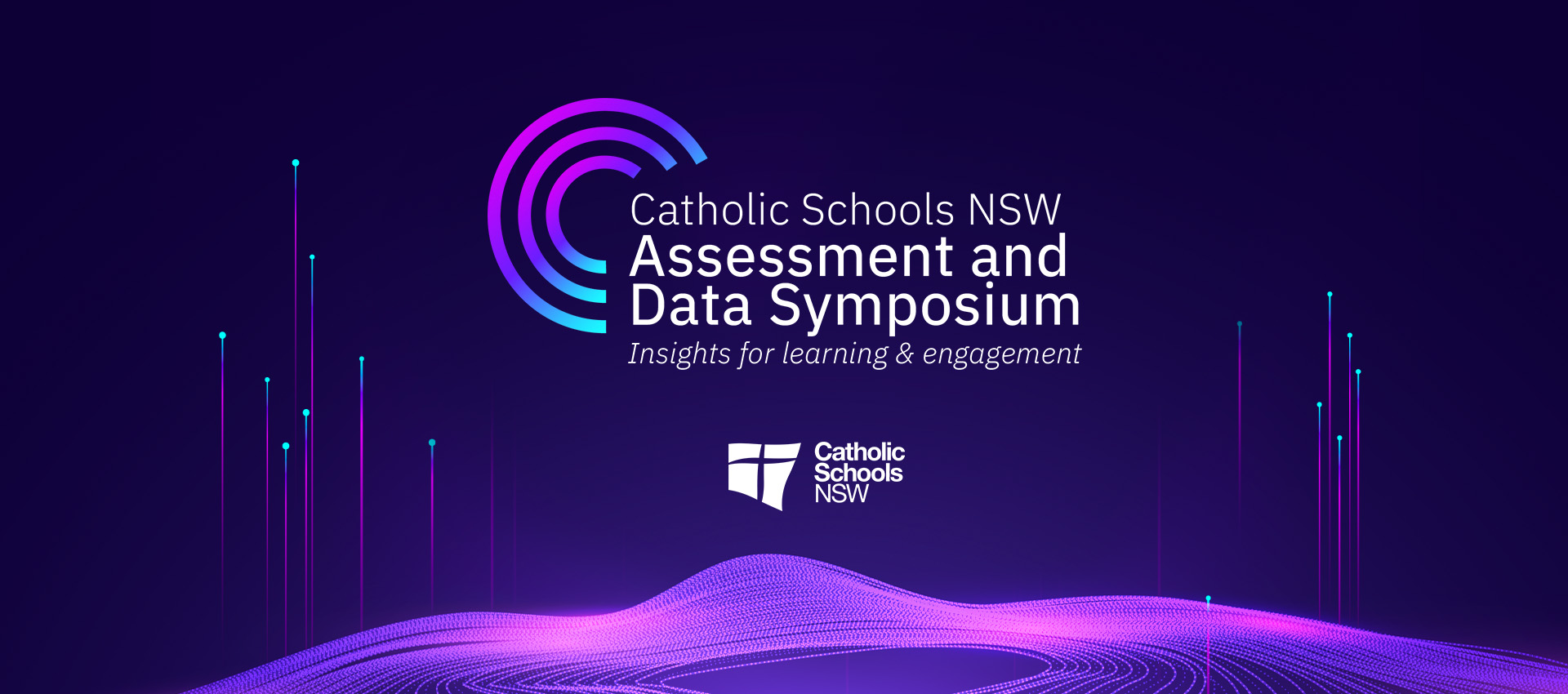Catholic Schools NSW Assessment and Data Symposium 2023: Insights for Learning and Engagement
Join us at the 2023 Catholic Schools NSW Assessment and Data Symposium as we delve into the innovative use of data in schools.
This event offers a unique opportunity to learn from esteemed academics, collaborate with fellow educators, and gain valuable insights and strategies for turning data into practical outcomes that positively impact student learning and engagement.
The symposium aims to unlock the full potential of data and drive positive change within educational institutions. By attending, educators will have the chance to engage in conversations led by leading academics in assessment, data practice, and research.
Participating in the symposium will empower educators to enhance their professional knowledge and skills, enabling them to effectively utilise interconnected data and create comprehensive solutions that foster the holistic development of students.
Together, let’s shape the future of Catholic education in NSW.
Floor Map
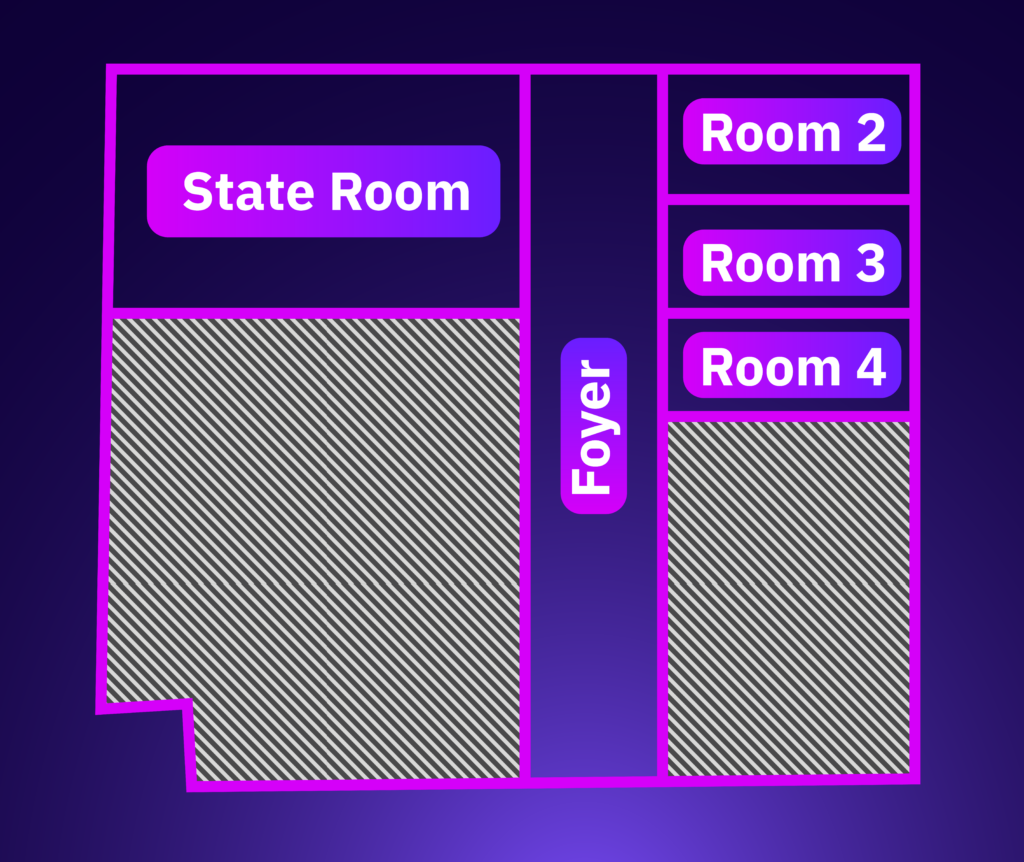
Date & Time
Friday, 29 September 2023
8:00 AM – 4:15 PM AEST
Venue
Hilton Sydney
488 George St, Sydney NSW 2000, Australia
Registrations are closed
| 8:40 - 9:00 | Opening Remarks – Insights for Learning and Engagement |
|---|
Dallas McInerney – Chief Executive Officer, Catholic Schools NSW

Dallas McInerney is the Chief Executive Officer of Catholic Schools NSW Ltd, the System Authority for the State’s 550 Catholic Schools. He is a cabinet appointee to the Board of the NSW Education Standards Authority and a Director of Catholic Employment Relations Ltd.
Dallas previously held senior roles in the private sector (Insurance Australia Group and National Australia Bank) and in Government at the corporate regulator, ASIC.
In 2007, Dallas was invited to join DFAT’s Young Leaders Programme with delegations through Asia, prior to this, he interned for the H.E Kofi Annan, Secretary – General of the United Nations in New York and has read for Masters degrees at the Universities of Sydney and Oxford.
| 9:00 – 9:40 | Keynote 1: Assessment and Learning and Why Teachers Still Matter |
|---|
In this presentation, Professor Hopfenbeck will draw upon her research in classroom-based assessment, self-regulation and large-scale assessment studies over the past 20 years.
Despite advancements in technology and changes in educational practices, teachers remain indispensable in the learning process in schools. Teachers’ ability to assess, personalise, and nurture students' growth is pivotal in shaping the future of education.
Effective assessment practices, when combined with dedicated educators, ensure that students acquire knowledge and develop the skills and mindset needed to thrive and be hopeful in the complex and uncertain world beyond the classroom.
Professor Therese N. Hopfenbeck, Director, Educational Assessment, Assessment and Evaluation Research Centre, University of Melbourne

Therese is currently the Director of the Assessment and Evaluation Research Centre at the University of Melbourne, leading several research projects on assessment and evaluation nationally and internationally. Her research agenda focuses upon bridging research on self-regulation and classroom-based assessment and making sense of international large-scale studies in education.
| 9:40 – 10:00 | Discussion and Q & A |
|---|
Professor Therese N. Hopfenbeck, Director, Educational Assessment, Assessment and Evaluation Research Centre, University of Melbourne

Therese is currently the Director of the Assessment and Evaluation Research Centre at the University of Melbourne, leading several research projects on assessment and evaluation nationally and internationally. Her research agenda focuses upon bridging research on self-regulation and classroom-based assessment and making sense of international large-scale studies in education.
Dr Tim O'Leary, Director, Educational Data Talks

Dr O’Leary is a strong advocate for using evidence to support decision-making within the Australian education sector, driving reflective practice and continuous improvement. With twenty years of experience in the education sector, Dr O'Leary has worked as a classroom teacher through to a senior leader within schools focused on embedding the use of evidence to inform practice.
More recently, as a consultant collaborating with schools, Tim O'Leary's work has focused on supporting schools to use evidence to identify opportunities to enhance teaching practices, elevate student learning outcomes, and understand school culture and impact.
Tim O'Leary's professional interests are faceted and focus on the effective use of data and evidence, in its various forms, to improve educational practice from systems to schools to classrooms. This includes using data to differentiate teaching and learning, understand impact, identify areas for improvement, and monitor the implementation of initiatives and practices.
Tim O'Leary believes in the importance of working with teachers and school leaders to build individual and collective capability.
| 10:00 – 10:40 | Keynote 2: Teachers at the Centre of Assessment |
|---|
This presentation emphasises the limitations of relying solely on summative scores from standardised tests as the primary source of data for teachers. Instead, it suggests that teachers should consider a broader range of information that can provide insights into students’ needs and be organised for systematic analysis. While summative scores are important, they are not the most useful or commonly used by teachers. The presentation proposes a shift towards teacher centric approach to assessment and data, focusing on the continuous interactions and formative assessments that occur during daily lessons. These interactions provide a more comprehensive understanding of students’ knowledge and emotions.
The presentation introduces a project aimed at addressing the challenge of achieving consistency in teacher judgements against standards across an education system. It poses the question of how to place teachers at the centre of assessment and ensure the validity and fairness of daily assessment and data use practices in schools.
Professor Jim Tognolini, Director, Centre for Educational Measurement and Assessment, University of Sydney

Jim is the Director of the Centre for Educational Measurement and Assessment at the University of Sydney. Before his appointment, Professor Tognolini was responsible for building assessments and measures for governments nationally and internationally.
Jim was in residence as a Professor and Senior Research Fellow at the Oxford University Centre for Educational Assessment for part of each year from 2009 to 2013 and has been an active participant in the workshop program of the Centre, which he established.
His specialist research and educational evaluation work focus primarily on psychometrics, educational assessment and the research, development and application of measurement models and theoretical perspectives to education and learning in both local and international contexts. Jim has won numerous grants nationally and internationally and currently supervises 12 PhD students through the Centre.
| 11:10 - 11:50 | Keynote 3: Contemporary Assessment – What’s Next? |
|---|
‘It was the best of times, it was the worst of times’ as Dickens kicked off A Tale of Two Cities. This session takes a collaborative, provocative approach to examining the impact of new and emerging technology on contemporary assessment practices.
This keynote will provide an accessible overview of how large language models, such as ChatGPT, operate conceptually, and explore the resulting consequences. Through recent case studies, we will reflect on the risks and rewards of technology in assessment and how it affects teachers, students, and learning. The session will conclude with ample time for questions, answers, and joint exploration of our exciting yet sometimes unnerving new world.
Dr James Curran, Chief Executive Officer, Grok Academy and Director, National Computer Science School

Dr Curran is the CEO of Grok Academy, an Australian ed-tech charity with a mission to educate all learners in transformative computing skills, knowledge, and dispositions, empowering them to meet the challenges and seize the opportunities of the future.
James wrote on the Australian Curriculum: Digital Technologies (version 8 and 9) and Digital Literacy Capability (version 9). He consults with curriculum authorities and departments of education around Australia. In 2014, James was named ICT Leader of the Year by the ICT Educators of NSW and the Australian Council for Computers in Education.
James is the Director of the National Computer Science School, Australia’s largest computer science school outreach program. Last year, over 22,500 students and teachers participated in the 5-week National Computer Science School Challenge.
Prior to Grok Academy, James completed a PhD in computational linguistics at the University of Edinburgh. He was an Associate Professor and Director of the Australian Computing Academy (ACA) at the University of Sydney. James co-founded Grok Learning in 2013, and in 2021, the ACA and Grok Learning combined to form Grok Academy.
Dr Kelly Stephens, Director, Edtech and Education Policy, University of Technology Sydney

Dr Stephens has over two decades of experience in education research and policy, including 10 years as Director, Strategic Analysis within the NSW Centre for Education Statistics and Evaluation. During this time, Kelly led critical projects distilling evidence for schools of 'what works best', including a focus on insights from the learning sciences. Kelly is currently at UTS, collaborating with Professor Leslie Loble on a project to ensure that Australian students benefit from high-quality education technology, and that edtech realises its potential to help close equity gaps in learning experiences and outcomes.
| 11:50 – 12:15 | Discussion and Q & A |
|---|
Dr James Curran, Chief Executive Officer, Grok Academy and Director, National Computer Science School

Dr Curran is the CEO of Grok Academy, an Australian ed-tech charity with a mission to educate all learners in transformative computing skills, knowledge, and dispositions, empowering them to meet the challenges and seize the opportunities of the future.
James wrote on the Australian Curriculum: Digital Technologies (version 8 and 9) and Digital Literacy Capability (version 9). He consults with curriculum authorities and departments of education around Australia. In 2014, James was named ICT Leader of the Year by the ICT Educators of NSW and the Australian Council for Computers in Education.
James is the Director of the National Computer Science School, Australia’s largest computer science school outreach program. Last year, over 22,500 students and teachers participated in the 5-week National Computer Science School Challenge.
Prior to Grok Academy, James completed a PhD in computational linguistics at the University of Edinburgh. He was an Associate Professor and Director of the Australian Computing Academy (ACA) at the University of Sydney. James co-founded Grok Learning in 2013, and in 2021, the ACA and Grok Learning combined to form Grok Academy.
Dr Kelly Stephens, Director, Edtech and Education Policy, University of Technology Sydney

Dr Stephens has over two decades of experience in education research and policy, including 10 years as Director, Strategic Analysis within the NSW Centre for Education Statistics and Evaluation. During this time, Kelly led critical projects distilling evidence for schools of 'what works best', including a focus on insights from the learning sciences. Kelly is currently at UTS, collaborating with Professor Leslie Loble on a project to ensure that Australian students benefit from high-quality education technology, and that edtech realises its potential to help close equity gaps in learning experiences and outcomes.
Dr Tim O'Leary, Director, Educational Data Talks

Dr O’Leary is a strong advocate for using evidence to support decision-making within the Australian education sector, driving reflective practice and continuous improvement. With twenty years of experience in the education sector, Dr O'Leary has worked as a classroom teacher through to a senior leader within schools focused on embedding the use of evidence to inform practice.
More recently, as a consultant collaborating with schools, Tim O'Leary's work has focused on supporting schools to use evidence to identify opportunities to enhance teaching practices, elevate student learning outcomes, and understand school culture and impact.
Tim O'Leary's professional interests are faceted and focus on the effective use of data and evidence, in its various forms, to improve educational practice from systems to schools to classrooms. This includes using data to differentiate teaching and learning, understand impact, identify areas for improvement, and monitor the implementation of initiatives and practices.
Tim O'Leary believes in the importance of working with teachers and school leaders to build individual and collective capability.
| 12:15 – 1:00 | Keynote 4: Data Visualisationn |
|---|
Data visualisation is typically for a specific audience. To effectively present information, it is crucial to understand the audience’s needs and explain the data clearly, concisely, making it easily digestible. This requires an understanding of human cognition, the audience’s motivations, and effective design principles. In this session, Rachel will explore how people think, the importance of understanding your audience, and the principles of design that can help you effectively communicate your points in a compelling and influential way.
Rachel Fojtik, Director, Data Literate by Design

Rachel Fojtik has over 20 years' experience helping organisations leverage data for informed decision making and storytelling. Rachel's company Data Literate by Design runs workshops on data strategy, data literacy programs, and masterclasses in data visualisation and storytelling with data. Rachel enjoys design, problem solving, and strategy but especially understanding people and the way they think.
| Workshop 1: Growing Up in Australia - A Longitudinal Study of Children and Their Families | |
|---|---|
| Room 4 |
LSAC is Australia's national children's study and has been following newborns and 4 year olds every two years since 2004. The study provides a comprehensive assessment of child and youth development from children and young people, their parents and their teachers and linked data from Medicare, NAPLAN and the Australian Early Development Census. In this session Professor Edwards will highlight some key findings about Australian students and how educators can access resources to learn more.
Professor Ben Edwards, Senior Fellow, Centre for Social Research and Methods, Australian National University

Professor Edwards is a Senior Fellow at the ANU Centre for Social Research and Methods. An internationally expert in longitudinal studies of child and youth development, Ben is Principal Investigator of GENERATION, a new decade long study following over 15,000 students as they transition to life beyond school and led the design of the Longitudinal Study of Australian Children for almost a decade. His research focuses on social policy issues affecting children and youth including school starting age, school attendance and intergenerational impacts of traumatic events. He works with Federal and State governments, the United Nations and the OECD.
| Workshop 2: Measuring the Unmeasurable | |
|---|---|
| Room 2 |
This session takes up the challenge of Andy Hargreaves who in 2011 wrote, ‘measure what you value instead of valuing only what you can measure.’ It also has at its heart The Mparntwe Statement (Education Council, 2019) [The Alice Springs Declaration] www.education.gov.au/alice-springs-mparntwe-education-declaration which articulates the set of goals and associated outcomes agreed to by education ministers from each state in Australia to “promote excellence and equity and enable all Australians to become confident and creative individuals, successful learners, and active and informed community members”. How many of you can put your hands on our hearts and say that you know where your schools (students) are at on some of these key outcomes that are relevant to your school; where you want to be; and, how to get there?
This session is designed to start a conversation driven by Lee Cronbach’s advice (1990) that “If a thing exists, it exists in some amount. If it exists in some amount, it can be measured”. If you value faith, student engagement, resilience, responsibility, etc. in your school, what evidence do you have that you are having an impact?
During the session you will have some time to share with other participants what potentially might be some of the attributes, characteristics and “Declaration outcomes” that you value but have not taken up the challenge to measure because “up to date” they have been considered to be “immeasurable”?
Professor Jim Tognolini, Director, Centre for Educational Measurement and Assessment, University of Sydney

Jim is the Director of the Centre for Educational Measurement and Assessment at the University of Sydney. Before his appointment, Professor Tognolini was responsible for building assessments and measures for governments nationally and internationally.
Jim was in residence as a Professor and Senior Research Fellow at the Oxford University Centre for Educational Assessment for part of each year from 2009 to 2013 and has been an active participant in the workshop program of the Centre, which he established.
His specialist research and educational evaluation work focus primarily on psychometrics, educational assessment and the research, development and application of measurement models and theoretical perspectives to education and learning in both local and international contexts. Jim has won numerous grants nationally and internationally and currently supervises 12 PhD students through the Centre.
| Workshop 3: Improving Assessment Practices for Frontline Teachers | |
|---|---|
| Room 3 |
Assessment practices are evolving. Faced with increased teacher workload, growing appetite for online experiences and the potential of artificial intelligence, technology promises to augment all points of the assessment lifecycle.
This session will explore changes to assessment authoring, testing, grading and reporting including artificial intelligence tools, and share key consultation insights from students, teachers, parents and system administrators. Attendees will learn about the CSSA online assessment pilot currently underway and gain an understanding of how they can get involved.
Monica O'Brien, Head of CSSA Exams, Catholic Schools NSW

Monica O’Brien (BA, DipEd, GradCert RE, GradCert Gifted Education, MEd, MEdLead, BPsychSc) is the Head of CSSA Exams and a member of the Education Directorate at Catholic School NSW. She has served in numerous leadership roles in two RI/PMJP schools and always with a focus on transformational change. Monica was responsible for the school wide NESA Registration and Accreditation process inclusive of curriculum and teaching and learning. In her numerous roles Monica has worked extensively in supporting teachers to understand how assessment and data provides insights for student learning and engagement.
Alex Dore, Founder of Gradeo

Alex Dore, Founder of Gradeo, an education technology start-up specialising in online assessment. Gradeo’s mission is to transform the way teachers assess and students sit assessments through technology. He is a director at a large global management consulting firm, where he has led multiple flagship programs, including the successful rollout of the national Higher Apprenticeship Pilot and development of the National Microcredentials Framework.
| Workshop 4: Tools and Tips for Data Impact | |
|---|---|
| State Room |
This session will delve into Gestalt Design Principles, Colour Theory, and their practical application in creating visually effective charts that facilitate clear communication. Additionally, the workshop will explore ethical considerations in chart selection and layout to maximise their impact. By mastering these techniques, school leaders will be equipped with powerful tools to effectively convey information and engage stakeholders through visually compelling charts.
Rachel Fojtik, Director, Data Literate by Design

Rachel Fojtik has over 20 years' experience helping organisations leverage data for informed decision making and storytelling. Rachel's company Data Literate by Design runs workshops on data strategy, data literacy programs, and masterclasses in data visualisation and storytelling with data. Rachel enjoys design, problem solving, and strategy but especially understanding people and the way they think.
| 2:25 – 3:15 | Keynote 5: Data. Fuel for Building Collective Efficacy |
|---|
There is no doubt that data is an important ingredient for school improvement. In reality, though, it is not simply about having data but rather doing something impactful with it. This presentation will discuss the important role data has as the fuel for collaborative action and building collective efficacy.
Dr Tim O'Leary, Director, Educational Data Talks

Dr O’Leary is a strong advocate for using evidence to support decision-making within the Australian education sector, driving reflective practice and continuous improvement. With twenty years of experience in the education sector, Dr O'Leary has worked as a classroom teacher through to a senior leader within schools focused on embedding the use of evidence to inform practice.
More recently, as a consultant collaborating with schools, Tim O'Leary's work has focused on supporting schools to use evidence to identify opportunities to enhance teaching practices, elevate student learning outcomes, and understand school culture and impact.
Tim O'Leary's professional interests are faceted and focus on the effective use of data and evidence, in its various forms, to improve educational practice from systems to schools to classrooms. This includes using data to differentiate teaching and learning, understand impact, identify areas for improvement, and monitor the implementation of initiatives and practices.
Tim O'Leary believes in the importance of working with teachers and school leaders to build individual and collective capability.
| 3:15 – 4:00 | Keynote 6: More Than Weighing the Pig – How AERO Makes Assessment Matter |
|---|
In this session, Dr Donovan will unpack how AERO is revolutionising assessment methodologies. She will explore the transformative power of data in education and provide strategies to make assessment meaningful and impactful.
Dr Jenny Donovan, Chief Executive Officer, Australian Education Research Organisation

Dr Donovan is the CEO of the Australian Education Research Organisation. Prior to this role, she established and led the Centre for Education Statistics and Evaluation (CESE) as Executive Director for 8 years.
Jenny Donovan began her career as a high school teacher in Sydney’s western suburbs. She has worked in a number of education roles in operational and policy areas, including some years as Deputy Director of a not-for-profit education assessment agency at the University of New South Wales. She was Managing Director of the National Learning Progressions and Online Formative Assessment Initiative, a national priority project for Australian education ministers.
She holds a Bachelor of Arts with a Diploma of Education from Macquarie University, MA (Hons) from UNSW and a PhD in history from the University of Sydney.
| 4:00 – 4:15 | Closing Remarks |
|---|
Danielle Cronin – Director of Education Policy, Catholic Schools NSW

Danielle Cronin is the Director of Education Policy at Catholic Schools NSW. With a wealth of experience in senior leadership positions, Danielle is responsible for representing the sector in significant national and state policy groups. Danielle holds degrees in Economics and Political Economy from the University of Sydney, as well as a Masters in Politics and Public Policy from Macquarie University. She is currently leading the CSNSW Strategic Workforce Review.
| FOR MORE INFORMATION ABOUT THE SESSIONS & SPEAKERS, CLICK ON THE SESSION NAMES IN THE AGENDA BELOW | |
|---|---|
| 8:00 – 8:30 | REGISTRATION |
| 8:30 – 8:35 | Acknowledgement of Country |
| 8:35 – 8:40 | Prayer and Housekeeping |
| 8:40 – 9:00 | Opening Remarks – Insights for Learning and Engagement Dallas McInerney – Chief Executive Officer, Catholic Schools NSW |
| 9:00 – 9:40 | Keynote 1: Assessment and Learning and Why Teachers Still Matter Professor Therese N. Hopfenbeck, Director, Educational Assessment, Assessment and Evaluation Research Centre, University of Melbourne |
| 9:40 – 10:00 | Discussion and Q & A Professor Therese N. Hopfenbeck, Director, Educational Assessment, Assessment and Evaluation Research Centre, University of Melbourne Dr Tim O’Leary, Director, Educational Data Talks |
| 10:00 – 10:40 | Keynote 2: Teachers at the Centre of Assessment Professor Jim Tognolini, Director, Centre for Educational Measurement and Assessment, University of Sydney |
| 10:40 – 11:10 | MORNING TEA |
| 11:10 – 11:50 | Keynote 3: Contemporary Assessment – What’s Next? Dr James Curran, Chief Executive Officer, Grok Academy and Director, National Computer Science School Dr Kelly Stephens, Director, Edtech and Education Policy, University of Technology Sydney |
| 11:50 – 12:15 | Discussion and Q & A Dr James Curran, Chief Executive Officer, Grok Academy and Director, National Computer Science School Dr Kelly Stephens, Director, Edtech and Education Policy, University of Technology Sydney Dr Tim O’Leary, Director, Educational Data Talks |
| 12:15 – 1:00 | Keynote 4: Data Visualisation Rachel Fojtik, Director, Data Literate by Design |
| 1:00 – 1:45 | LUNCH |
| 1:50 – 2:20 | Breakout Sessions |
| Room 4 | Workshop 1: Growing Up in Australia – A Longitudinal Study of Children and Their Families (LSCA) Professor Ben Edwards, Senior Fellow, Centre for Social Research and Methods, Australian National University |
| Room 2 | Workshop 2: Let’s Measure What You Value Instead of Valuing Only What You Can MeasureProfessor Jim Tognolini, Director, Centre for Educational Measurement and Assessment, University of Sydney |
| Room 3 | Workshop 3: Improving Assessment Practices for Frontline TeachersMonica O’Brien, Head of CSSA Exams, Catholic Schools NSW Alex Dore, Founder of Gradeo |
| State Room | Workshop 4: Tools and Tips for Data Impact Rachel Fojtik, Director, Data Literate by Design |
| 2:25 – 3:15 | Keynote 5: Data. Fuel for Building Collective Efficacy Dr Tim O’Leary, Director, Educational Data Talks |
| 3.15 – 4:00 | Keynote 6: More Than Weighing the Pig – How AERO Makes Assessment Matter Dr Jenny Donovan, Chief Executive Officer, Australian Education Research Organisation |
| 4.00 – 4:15 | Closing Remarks Danielle Cronin – Director of Education Policy, Catholic Schools NSW |
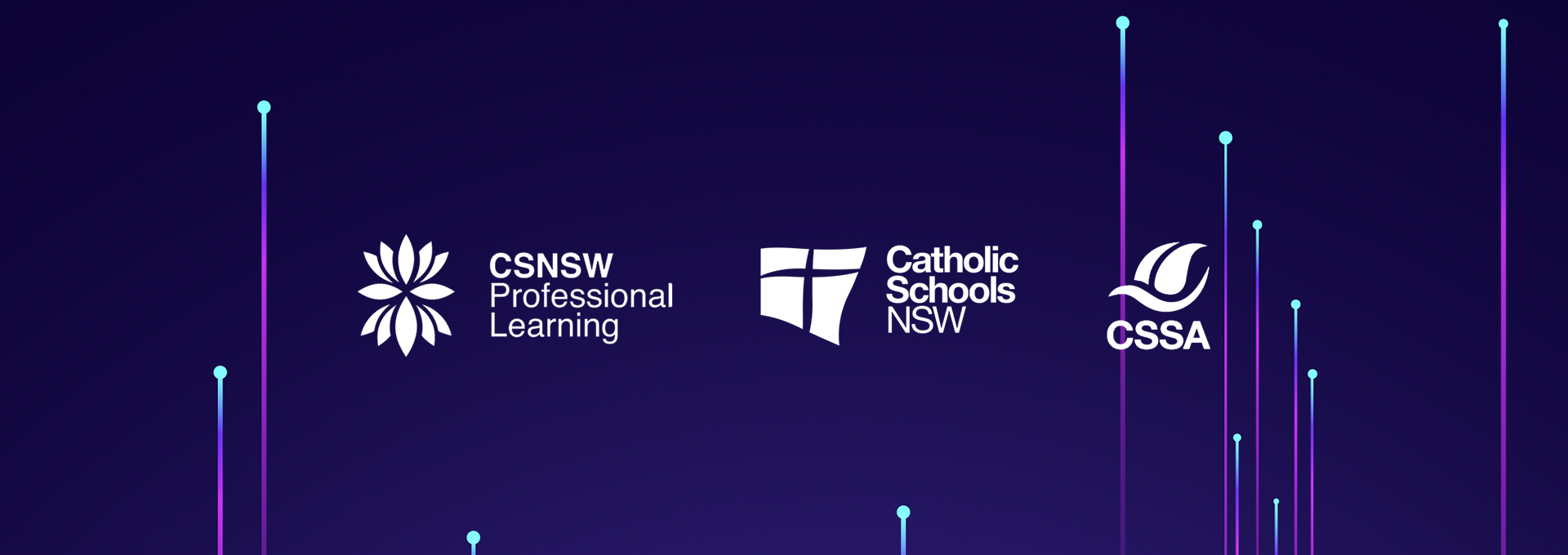
Latest news
Coming Soon.
Any questions?
We’re happy to help with any questions you might have. Please get in touch using the button below.
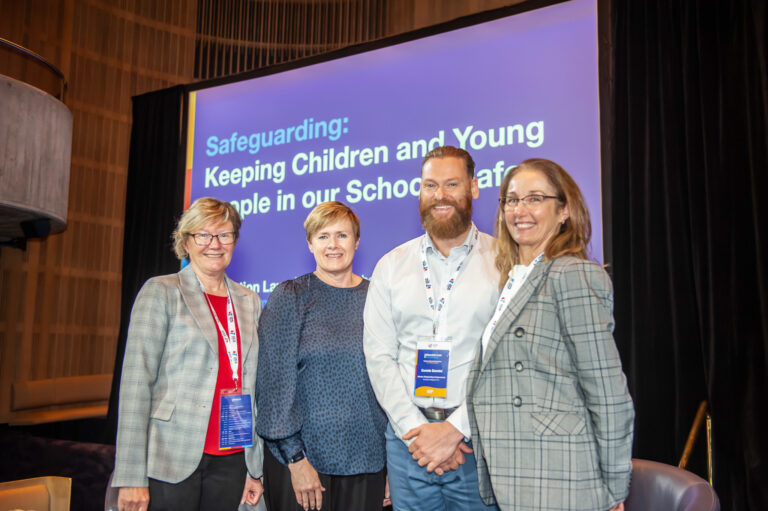
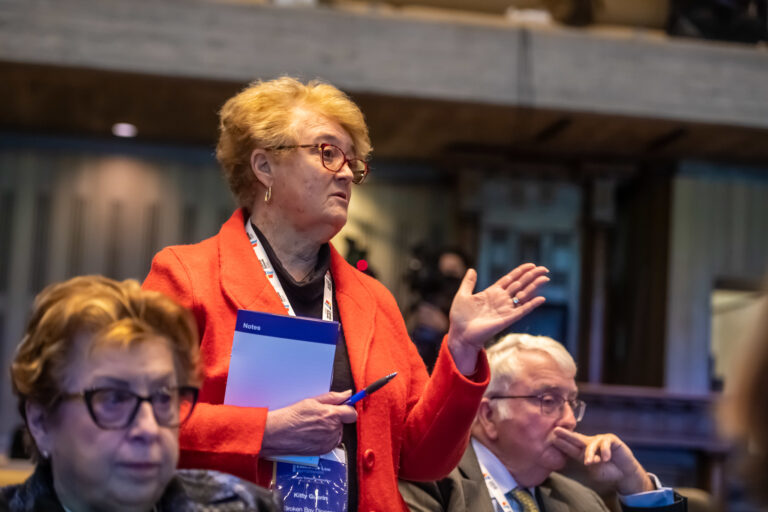
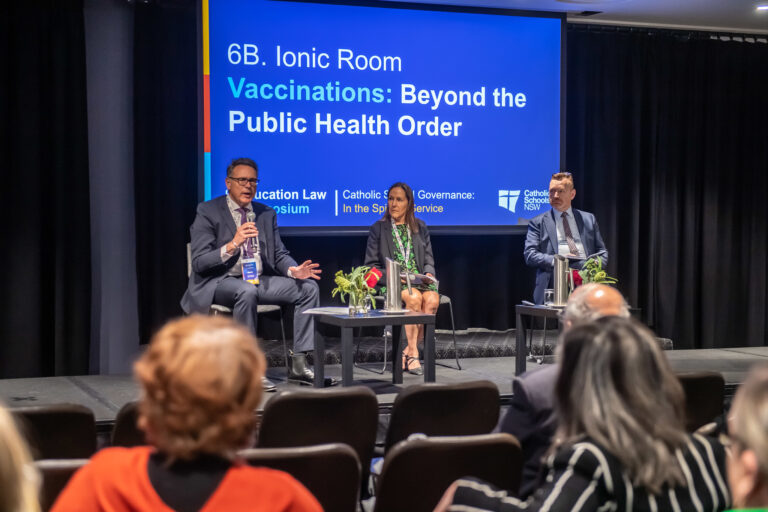
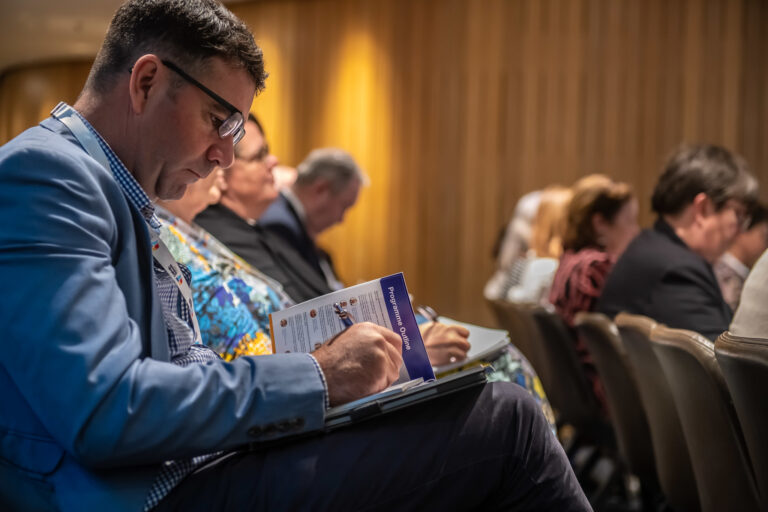
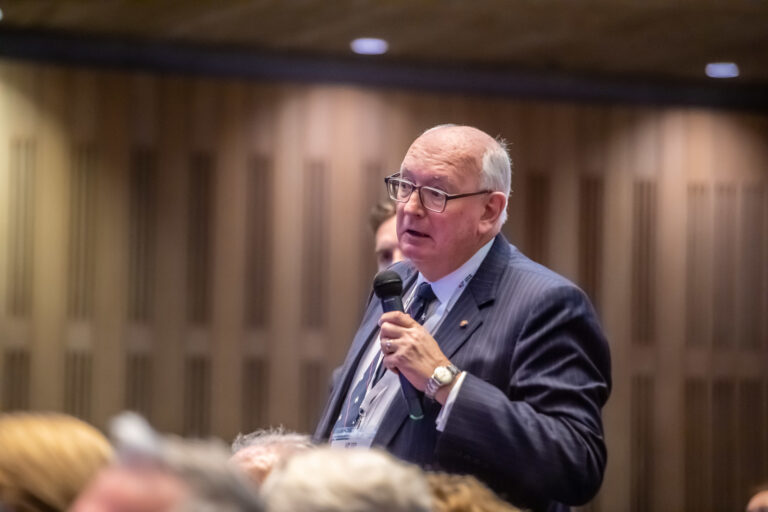
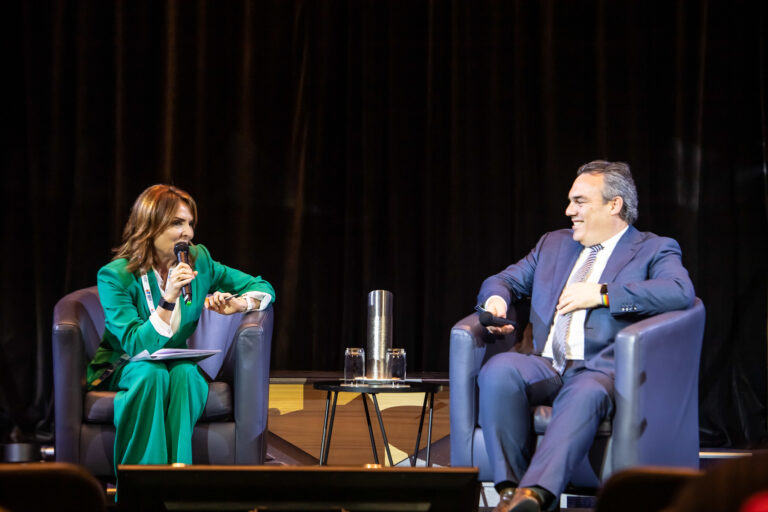
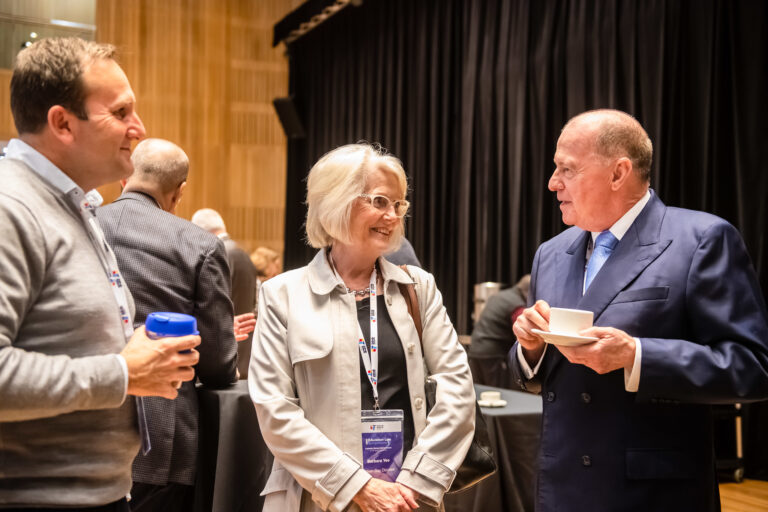
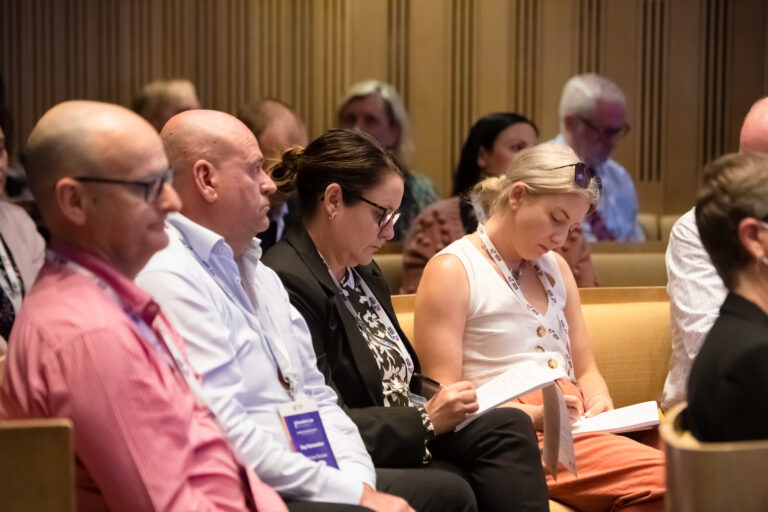
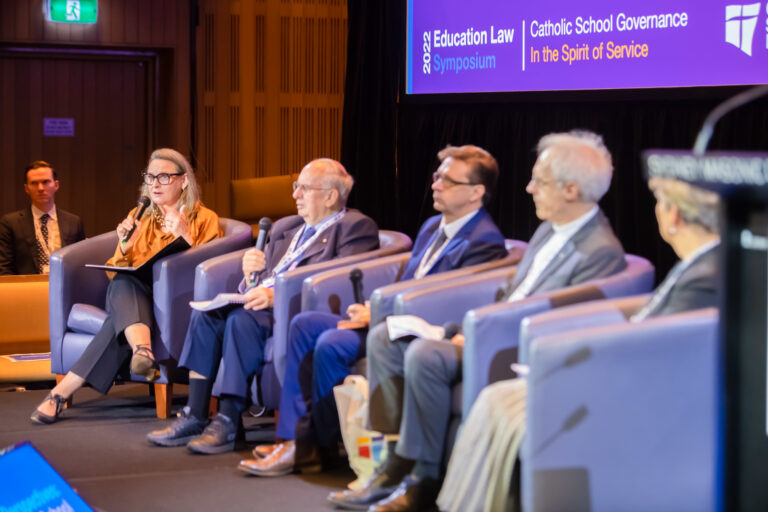
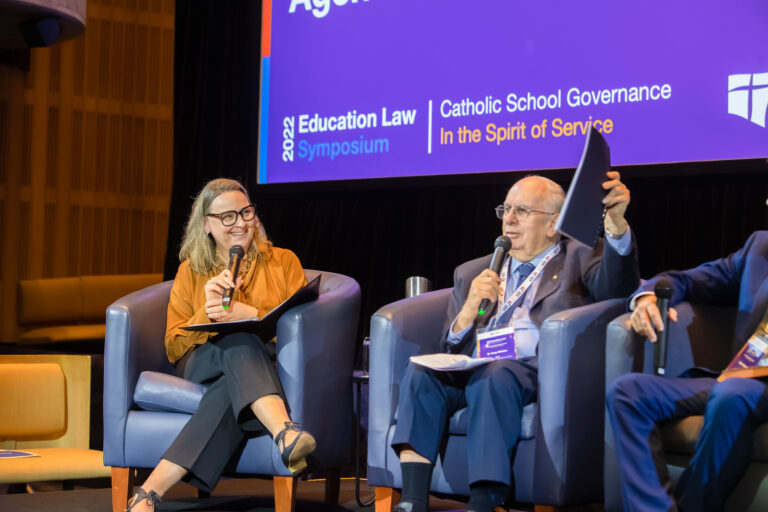
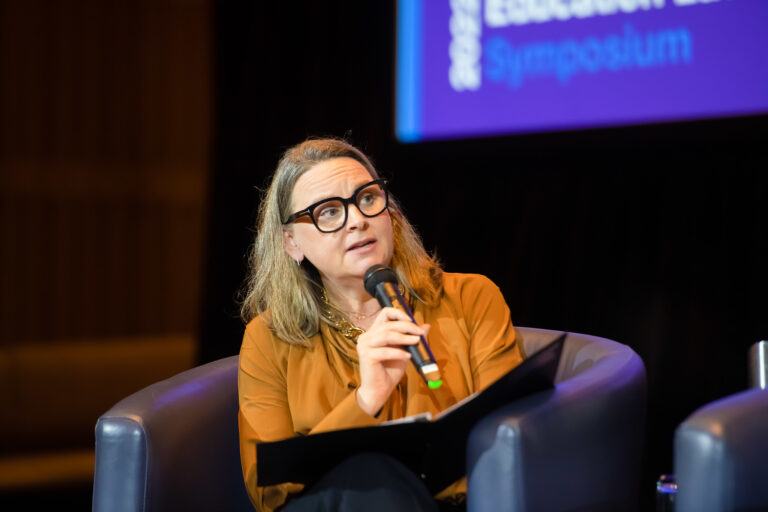
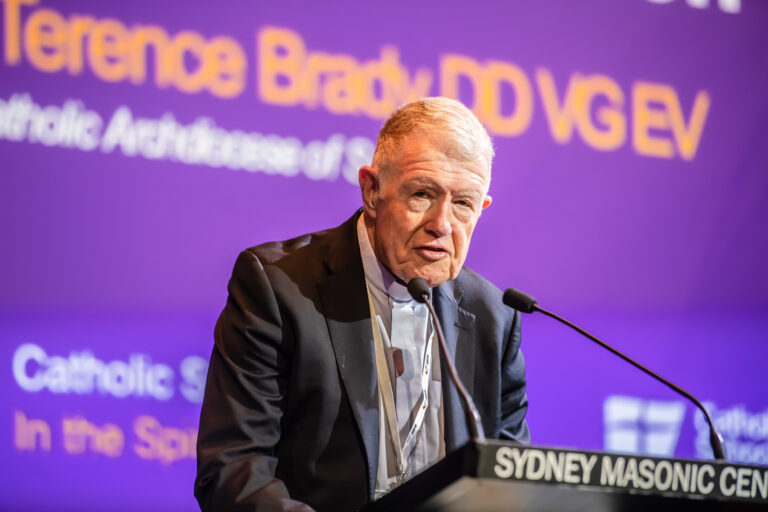
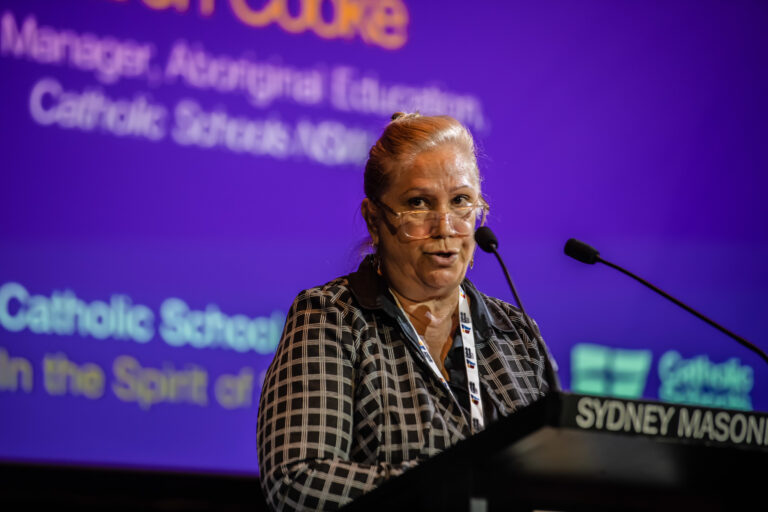
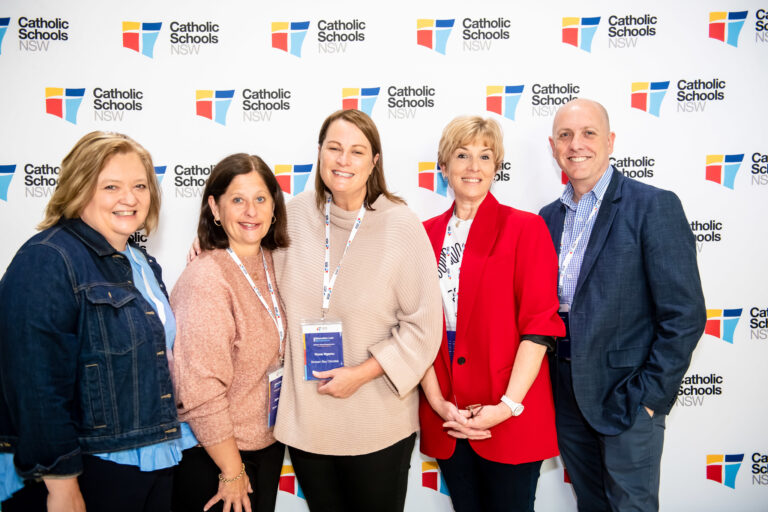
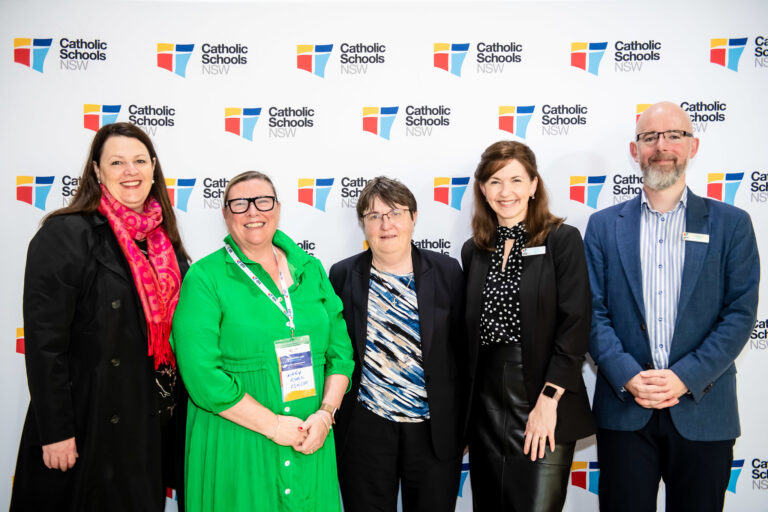
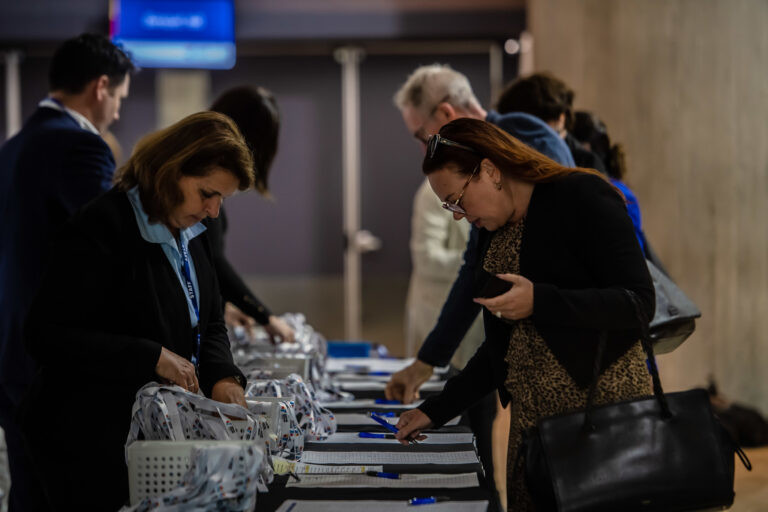
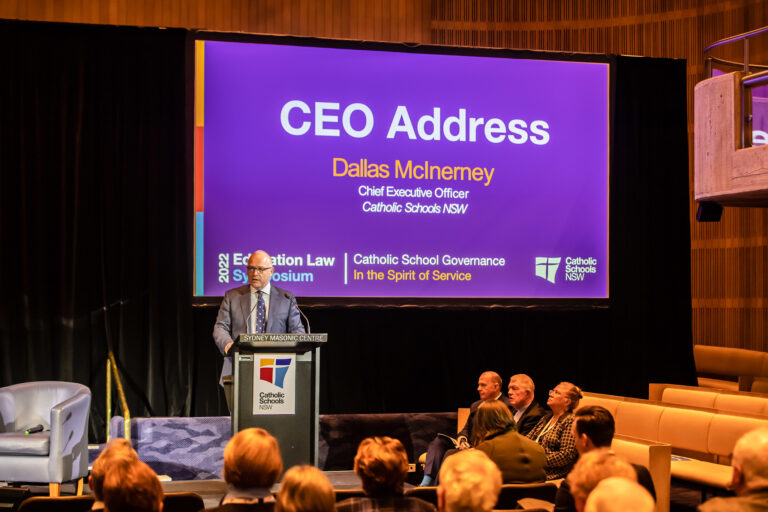
Wonder is the desire for knowledge - St Thomas Aquinas

